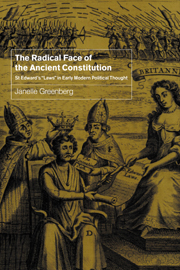Book contents
- Frontmatter
- Contents
- Acknowledgments
- 1 Hagiography and historiography: the long shadow of Edward the Confessor
- 2 “Those most noble and equitable laws of St. Edward”: from the cult of the Confessor to the cult of the Confessor's laws
- 3 “Divers and sundry ancient histories and chronicles”: the articulation of the ancient constitution in the Tudor period
- 4 “By lex terrae is meant the laws of St. Edward the Confessor”: the footprints of the Saxons in the early seventeenth century
- 5 “You shall be king while you rule well”: the radical ancient constitution in the civil wars and interregnum
- 6 “That noble transcript of the original contract, the Confessor's laws”: the radical ancient constitution in the late Stuart period
- Bibliography
- Index
3 - “Divers and sundry ancient histories and chronicles”: the articulation of the ancient constitution in the Tudor period
Published online by Cambridge University Press: 29 August 2009
- Frontmatter
- Contents
- Acknowledgments
- 1 Hagiography and historiography: the long shadow of Edward the Confessor
- 2 “Those most noble and equitable laws of St. Edward”: from the cult of the Confessor to the cult of the Confessor's laws
- 3 “Divers and sundry ancient histories and chronicles”: the articulation of the ancient constitution in the Tudor period
- 4 “By lex terrae is meant the laws of St. Edward the Confessor”: the footprints of the Saxons in the early seventeenth century
- 5 “You shall be king while you rule well”: the radical ancient constitution in the civil wars and interregnum
- 6 “That noble transcript of the original contract, the Confessor's laws”: the radical ancient constitution in the late Stuart period
- Bibliography
- Index
Summary
INTRODUCTION
If the middle ages saw the creation of an ancient constitution that Stuart rebels later deployed against their kings, the sixteenth century witnessed its more precise articulation. Indeed, throughout the Tudor period writers of different political persuasions repeated and elaborated on precisely those sources and stories that carried the ancient constitutionalist version of the past. Although they sometimes quibbled about certain details, virtually all found the essential institutions of English government flourishing in the Saxon age or earlier. And virtually all associated the common law with St. Edward and traced the survival of the ancient constitution through the conquest and the following centuries. That they did so suggests that seventeenth-century radicals deserve more credit for historical accuracy than they often receive. While they frequently put their own spin upon sources and stories, they nevertheless built on a tradition that descended to them through highly respected Tudor historical and legal writings. This chapter will examine the Tudor literature to which they were heir.
The literature itself was the product of an unprecedented inquiry into the nation's past, inspired by a confluence of ideas, events, and technology. Ironically, much of the initiative for this examination of early English history came from the Tudor monarchy, as it contested with the papacy for control of the English church. In order to legitimize the break with Rome, reformers, under royal sponsorship, probed historical records for proof that the English church represented the one, true religion that papists had long ago corrupted.
- Type
- Chapter
- Information
- The Radical Face of the Ancient ConstitutionSt Edward's 'Laws' in Early Modern Political Thought, pp. 79 - 115Publisher: Cambridge University PressPrint publication year: 2001



